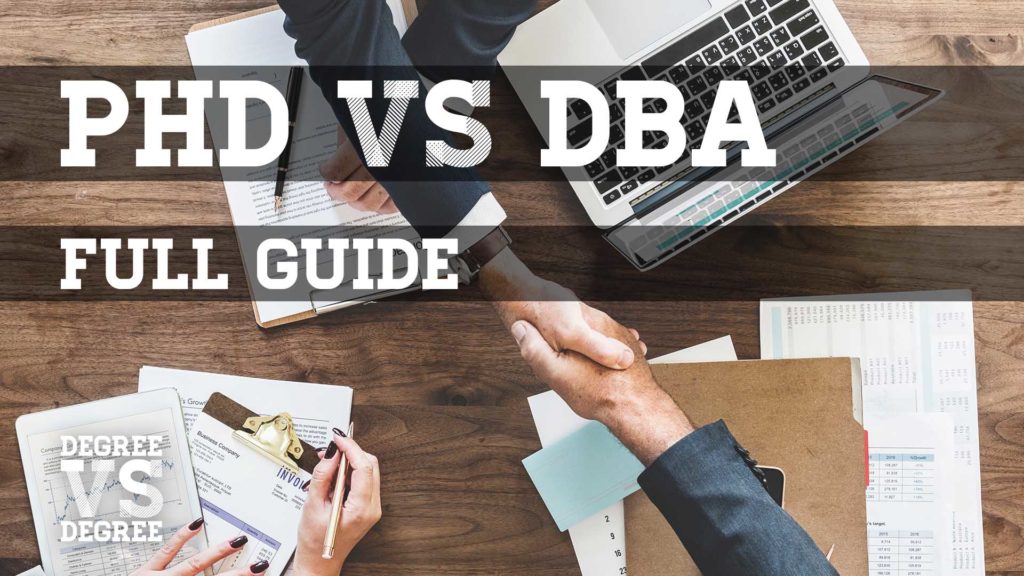Both the PhD (Doctor of Philosophy) and D.B.A. (Doctor in Business Administration) are doctoral-level programs that are rigorous and involve conducting research and understanding concepts that are advanced. The former is the highest degree that can be achieved at a university, and the latter is the highest form of post-graduation. But both these courses differ much in terms of career options, focus and the candidate’s profile.
For a candidate to pursue any of the two though, they need to know how to communicate and conduct research findings (academic) in the business field, based on a topic chosen by them. The PhD vs D.B.A. debate is an ongoing one.
DBA vs PhD in Business Administration
D.B.A.
This course can be seen as a follow up to an MBA (Masters in Business Administration), and a lot of D.B.A. programs require the candidate to have experience in management for admission. The programs are designed to satisfy the needs of professionals and senior managers to get an official nod for their management skills.
 The focus of most D.B.A. courses is for the candidate to acquire knowledge that is based on the latest business theories and research for business practices. Mostly offered on campus, these courses are also offered as distance learning or on weekends if the candidates are working professionals.
The focus of most D.B.A. courses is for the candidate to acquire knowledge that is based on the latest business theories and research for business practices. Mostly offered on campus, these courses are also offered as distance learning or on weekends if the candidates are working professionals.
In a D.B.A. program, candidates are expected to evaluate research in management and business, application of professional business ethics, find solutions to practical problems they may encounter in management and business and provide research that not only contributes to a positive social scale on a global or organizational level, but also to real-world problems.
PhD
People who usually go for a PhD are expected to continue in the profession of academia and have teaching positions within the university. Usually, the chosen professions are teachers, researchers and professional scholars. They may also go on to become senior researchers in large corporations or hold government positions.
The courses offered are typically in accordance with research methods, but the course material also may contain topics such as sustainability, leadership, business analytics, ethics and strategic analysis. Students are expected to learn about management decision making with the help of several tools, concepts and theories, use various analyses and design methods to help in the advancement of knowledge and conduct original and ethical research, among a lot of other things.
Average Time Taken to Complete D.B.A.
To complete a D.B.A., candidates have to complete about 30-40 courses, which means 90-120 semester credits. It requires 4 years of full-time study, and if the candidate has a master’s degree in the same field as the doctorate, the time frame could change to 3 years.
If you are more inclined towards business practice, an MBA may be a better option for you; you can also opt for the same if you have time constraints and do not wish to spend 4 years pursuing a D.B.A. Some schools or universities also allow their students to extend the time frame of the study if they decide to pursue doctoral research later.
Average Time Taken to Complete PhD
Unlike a full-time M.B.A., a PhD has no specific time frame. Students usually take about 3.5-4 years to finish their studies, but there are some cases that can go on for 7 years! But typically, the latter type of students don’t finish, and there are several factors that can influence this.
- Your Subject: If your subject is a fairly new one, it might take longer for you to complete the research. In general, some doctoral programs may take longer to complete.
- Advisors: Advisors can play an important role while you are finishing your PhD. If your advisor is resourceful, helpful and engaging, there is a fairly good chance that you might complete the research well within time. In another scenario, if you are not on good terms with your advisor, it may get delayed.
- Funding & Motivation: If you are likely to finish your research in a longer period, funding can become an impediment. In a very happy scenario where you were lucky enough to get generous funding, you are likely to finish your research well within the time frame. The same can be said about motivation; if you are really interested in your field of research and motivated enough to work hard towards it, it can also help complete your course in time.
Hopefully, this helps to quell the PhD vs D.B.A. debate.
Requirements to Enroll
If you want to enroll in either of the courses, it is expected of you to have a master’s degree. You will need to show good performance at your undergraduate level in most cases. For a PhD application, you will need to furnish a master’s degree and the same goes for the D.B.A. (an M.B.A. or equivalent) degree as well. In case of a PhD, you will be evaluated on whether you will be able to finish the research in time and if you are competent enough for the said course.
In the case of a D.B.A., you may need to show a significant amount of professional experience in senior management or leadership roles. A minimum of 3 years is required. For a PhD, the student will have to hold a visa or be a resident of the country where the research is to be completed. Both courses would require evidence of proficiency in the language (English is the preferred language).
PhD vs D.B.A.: Average cost
When you are making your application for a PhD, you are provided ample time to arrange for the funding. This would typically cost upwards of $25,000 to $45,000 but a lot of students can find the funding for most or all of their studies. PhD students are also paid stipends for their assistantship roles, but this may vary from school to school.
D.B.A. costs more than a PhD and may cost anything between $24,000 to $75,000 or more. This depends entirely on the college/university you go to.
Average Salaries
After the completion of both courses, you would be eligible to put the coveted “Dr.” prefix to your name, and that means comfortable salaries. For persons with a D.B.A., the average salaries range from $71,000 to $140,000 (or higher), while a scholar may make up to $70,000 to $200,000, depending on the organization or the country they are posted in.
The Verdict
No matter if you want to pursue a D.B.A. or a PhD, you should always gather as much information as possible before deciding on which course to go with. Always remember that these are both doctoral degrees and are equal in international acknowledgment, status and standing. What does differ with them is that they have different goals.

